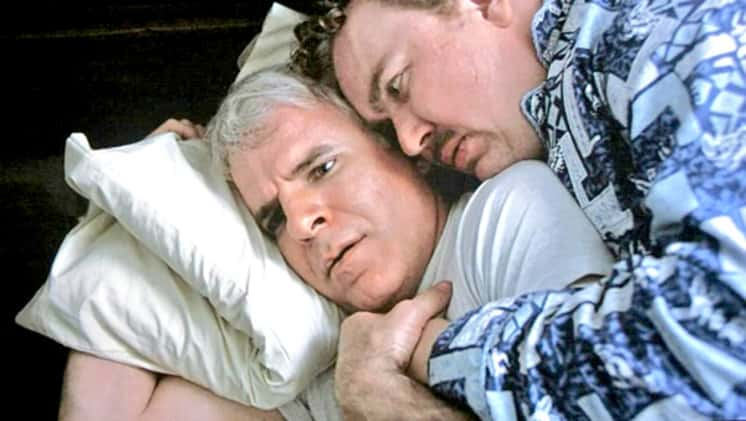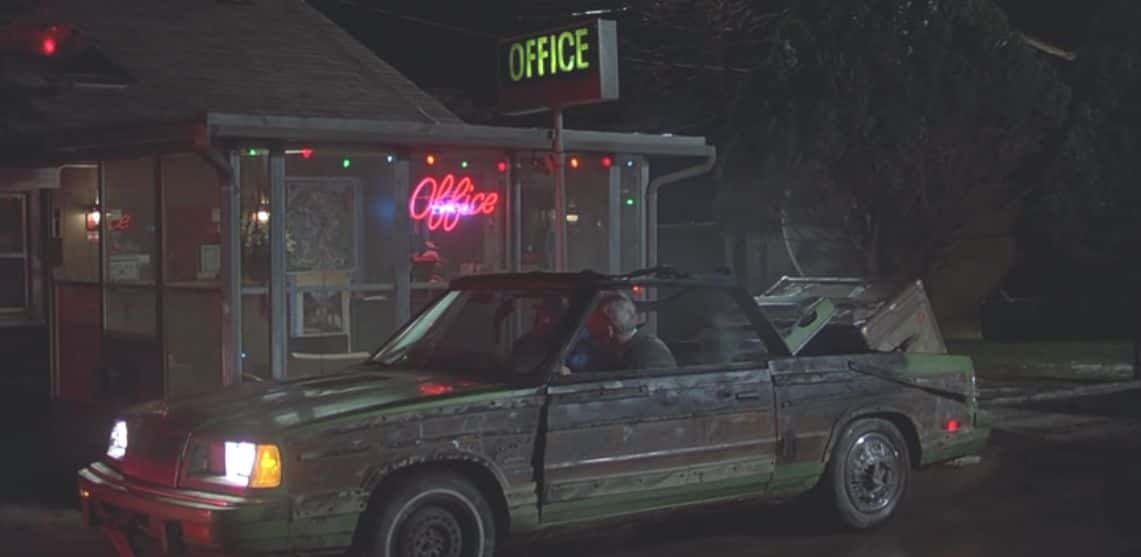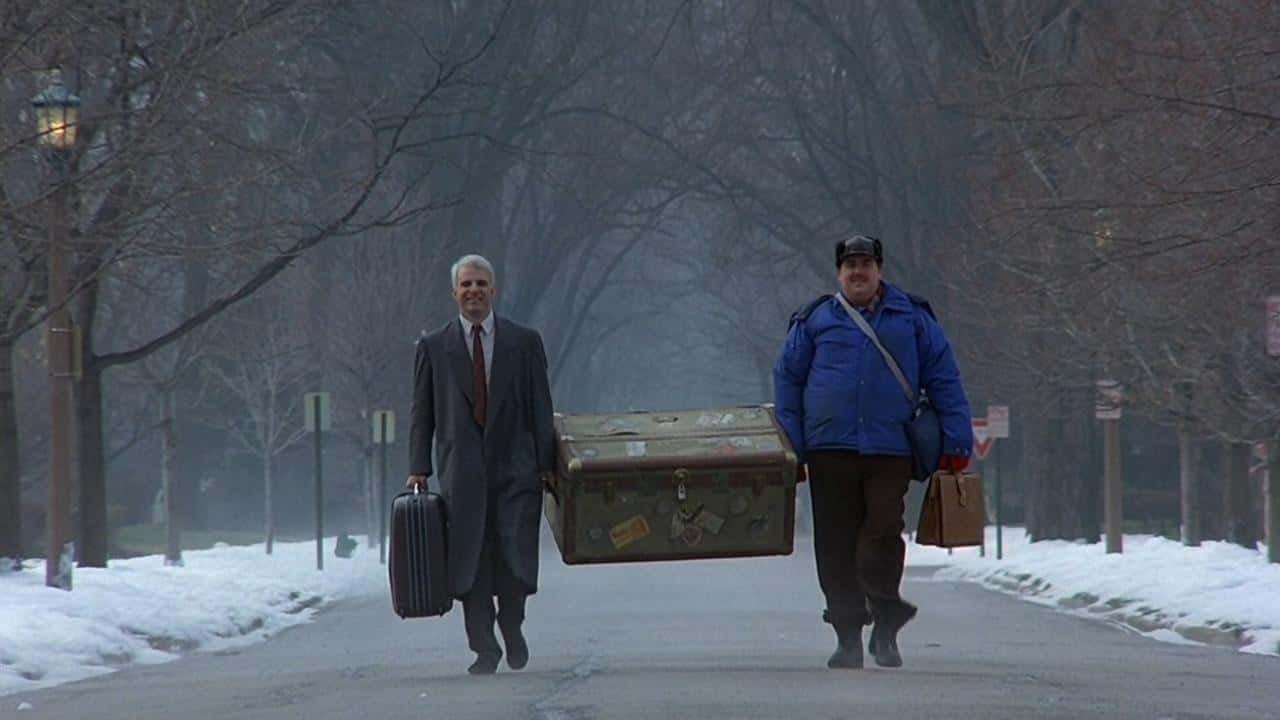Author: Deia Valez
DISCLAIMER: Spoilers!
I went to the movies with a friend, mostly for tradition, but also because it happened to be half price for being old and because there was a niche group of people looking to watch the movie. I can easily say that my friend and I were the youngest people in the theater that night to see John Hughes’s film Planes, Trains, and Automobiles. Having gone into the theater with no expectations, I was not surprised to find the archetype for comedy movies of the 80’s. The movie, on a surface level, follows the basic formula of: someone gets hurt HAHA SO FUNNY, someone falls down HAHA HILARIOUS!!! Initially, I thought to myself, this movie is shallow. This is an entire film about the flaws of relying on public transit. I watched as the protagonist desperately attempts to get from New York to Chicago for Thanksgiving, but oh no, his taxi is stolen…and he’s late to the airport…and his first class ticket is downgraded…and his flight is cancelled…and he gets stuck in a motel room with the annoying guy that stole his taxi…and the bus breaks down…and the train stops running…and the rental car is stolen…and the annoying guy is still hanging around messing things up…and his wallet is stolen…and the car bursts into flames… I was so frustrated watching something that was so monotonous and predictable that I was overlooking what was actually happening.

There was a scene that initially appeared to be just more of someone gets hurt and it is amusing, so let’s keep doing that over and over, because that’s what works. In this particular scene the protagonist, Neal (Steve Martin), a businessman, is brutalizing the secondary character, Del (John Candy), a shower ring salesman. He mocks Del for being too talkative and constantly ruining everything, among many other idiosyncrasies that have proven to be annoying to both Neal and the audience. The way Neal was going off on Del was funny. The audience laughed. Then the camera cut to Del’s face and he looks like he’s going to cry, but he stays quiet. The camera cuts back to Neal, and he’s still going. The laughter of the audience died down a little because now the camera is going back and forth between what is funny and serious. Hughes has just created an, Of Mice and Men dynamic between the too. It is clear that Neal feels he is more sophisticated than Del. By the time Neal is finished yelling at Del, Del is holding back tears, but his response is calm. He simply explains that despite what Neal, or anyone else thinks, his wife likes him, and more importantly, he likes himself, and he chooses to be empathetic to people because it makes him a better person. The scene was powerful, and serious, very out of place for the archetype comedy movie I thought I was watching. No one was laughing by the end. This same thing kept coming up where between the comedy, the characters alter their perspective on the world, or they encounter something far less superficial than slapstick.

Another instance being a scene where the pair are warming up to each other drinking minibar liquor after having driven to a motel in a car that just caught fire and bartering for a room. They share in there reasons for going home and discuss how deeply they both care for their wifes. When Neal remarks to Del that it is evident to him how much he loves his wife (maybe he gathered this from the framed picture of his wife that Del carries around constantly) Del simply replies, “Love is not a big enough word.” By the end of the film, it is revealed that Del’s wife is dead, and after getting Neal home to his family, Del is left alone.
I was discussing this particular movie with someone and they said to me, “You know, I just don’t understand why they do that. Why do they make comedies sad, or add the dark element. I’m watching the movie to laugh.” Planes, Trains, and Automobiles goes beyond slapstick. It was written as a comedy, however there is so much more complexity within the characters and their struggles that several other themes are introduced: marriage, friendship, death, love, family, and empathy. Del acts as a guiding figure to Neal, leading him to being a less cold person as he is portrayed in the beginning of the film in his business suit making his sharp comments. While Neal is the main character, it is Del in the supporting role that we learn most about. He is the example of what Neal should be: calm, loving, empathetic, patient. It is revealed early on that Del will act as more than a goofy, messy sidekick. We learn most about his story, leaving New York, returning home to Chicago for the first time in eight years since his wife died. This aspect of the film is a recurring theme for this director. In another one of Hughes’s films, Ferris Bueller’s Day Off , while Ferris is the main character, his friend Cameron is the most dynamic in that he shifts from being sick (literally having a clod) representing the sick lifestyle he lives in fear of his father and what it might be like to partake in life, to a brave, fearless, standalone character that realizes that he cannot let his dad, or anyone, interfere with his life. Thus following the pattern of Hughes’s style, a comedy that has underlying dark themes, extreme character growth, and a secondary character that is equally important to the primary character.
When I left the theater, I had a completely different opinion of the movie. I was still unable to discern if it was a movie I enjoyed, or if I was frustrated with the monotony and predictability of the surface level comedy. I left knowing the film stuck with me, and after further deliberation I decided I would definitely watch this movie again. I would gladly recommend this movie to a friend, and I so enjoyed picking it apart, therefore I must have enjoyed it.
Deia Zalez | I wish Buffy and Angel ended up together… | KXSU Arts Reporter

